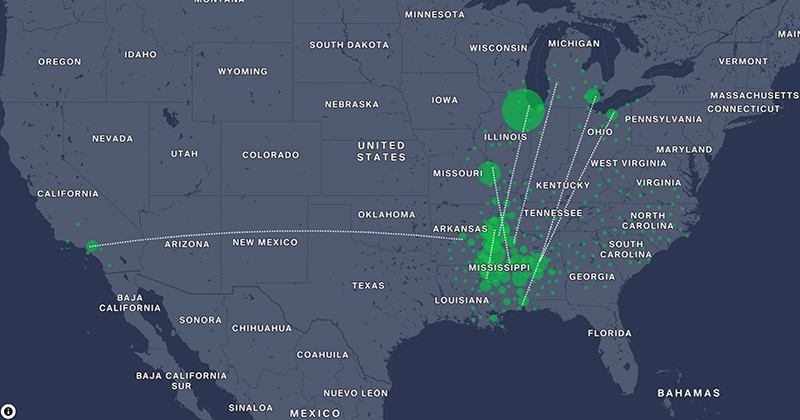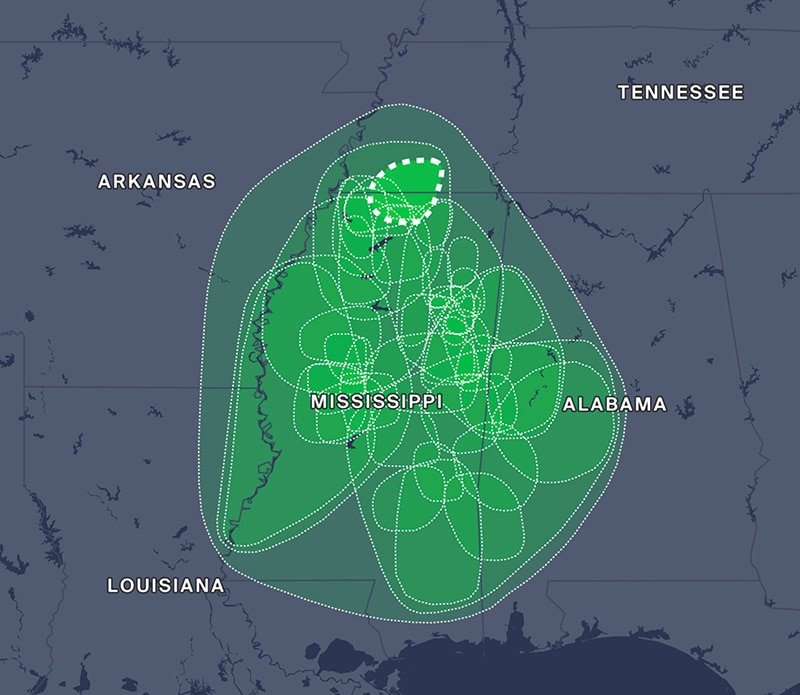The world’s largest online family history resource - Start now
African American genealogical research is uniquely rewarding yet notoriously complex. The discriminatory ways in which enslaved people were documented and disparities in record keeping for later generations pose formidable obstacles to documentary research. Genetic genealogy can help overcome barriers that were once insurmountable through the paper trail alone but it also presents its own set of challenges.
As it does with documentary research, slavery has a lasting impact on the two primary facets of DNA analysis: your ethnicity estimate and your ability to connect with matches. Nonetheless, understanding slavery’s impact on genetic genealogy and recognizing the challenges it presents can make it a powerful research tool and a meaningful way to connect with your African American heritage.

Information from Ancestry members’ family trees—combined with your own DNA test results—can show you the paths your ancestors might have taken over time, moving within the state or across the country. You can even see people from your tree depicted on the map who may have been a part of this event.
The Impact of Slavery on Ancestral DNA Origins
- The African regions in your origins results are likely to correspond with the areas where Africans were most often kidnapped during the Transatlantic Slave Trade: Nigeria, Cameroon, Congo, Mali, Senegal, Benin, Togo, Ivory Coast, and Ghana.
- The average African American genome is 20-25% European, owing in large part to sexual violence perpetrated by white enslavers, slave traders, and their associates onto enslaved women. Given the role white men played in perpetrating this violence, the proportion of European DNA is even higher on direct male lines. As a result of this history, Black test takers without any recent white ancestors may still have significant percentages of European DNA and distant white matches. The specific European regions often correspond with those most prevalent among Southern white settlers: English, Scottish, and Irish.
- An individual’s ancestral journeys, which can connect you into a network of related people who descended from a common group of ancestors in the past 300 years, are often geographically dispersed, reflecting the forced separation of enslaved families during the Domestic Slave Trade. For example, test takers with roots in the Deep South may have ancestral journeys in Louisiana and also in Maryland and Virginia.
The Impact of Slavery on Connecting with DNA Matches
- Given the biased and inconsistent ways in which enslaved people were documented, it can be challenging to determine how distant matches are related. Even if your ancestors were siblings who lived together until emancipation, they may have adopted different surnames which can make determining their connection a hard task to complete.
- If your ancestors were enslaved on the same plantation or in the same community for several generations, it is possible that they were interrelated in several different ways. This history of forced endogamy (a custom of marrying only within your community) can inflate relationship predictions and hinder your ability to identify a match’s most recent common ancestor.
- Given the persistent impacts of slavery on African American families, your matches’ family trees may have holes and voids, which can hinder your ability to identify your common ancestors. Moreover, access to DNA testing may limit the number of matches that you have.

Ancestral journeys can help you find the places your ancestors might have lived in the past 300 years, sometimes down to the county level.
Overcoming Challenges with Genetic Genealogy
Despite these challenges, combining DNA analysis with documentary research—such as exploring the Reconstruction-era Freedmen’s Bureau records—can enhance your research dramatically. In addition to the tips below, learn more details in the guide for African American family research on Ancestry.
- Search for clusters of interrelated matches that have shared locations, ancestors, or surnames in their trees then research their families to identify connections to your own. Even if their ancestors don’t share surnames with your own, consider the possibility that they are related but adopted different surnames after emancipation. You may be able to predict their relationships by reviewing your matches’ shared relatives, common locations, and genetic distances.
- If you hit a brick wall using the paper trail to identify your ancestors’ enslaver (the foremost component of enslavement research), investigate the people who enslaved your matches’ ancestors or lived near them during Reconstruction to determine if they also enslaved your own.
- Review your ancestral journeys, which are derived from common locations in your matches’ trees, to glean hints about where your ancestors were enslaved. Analyze the associated record collections on Ancestry, compiled by our own expert genealogists, to explore your heritage.
DNA testing has had a revolutionary impact on African American genealogy and the ability of Black families to trace their heritage. Although it presents unique challenges, understanding what the challenges are can amplify your research in powerful ways. Given the limitations of the paper trail, DNA results can be an exciting alternative for learning about your origins. Analyzing DNA matches can connect you with relatives who would otherwise be unfindable using the paper trail alone. See what you can discover by starting with an AncestryDNA® test.
-
Using DNA to Trace Your African American Heritage -
Daisy Bates Day in Arkansas -
Black History Month – Ancestry Initiatives to Honor Black Heritage -
Marking 80 Years Since Auschwitz Liberation: Our Commitment to Holocaust Remembrance
GET THE LATEST
New posts + monthly newsletter.
GET THE LATEST
New posts + monthly newsletter.
Sources
-
- https://www.loc.gov/resource/ppmsca.13305/
























